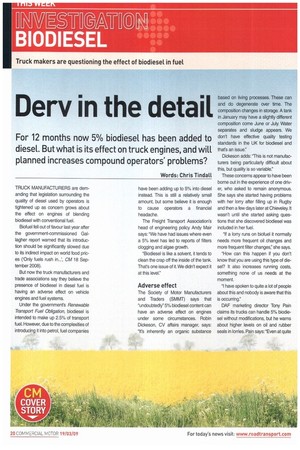Dery in the detail
Page 20

Page 21

If you've noticed an error in this article please click here to report it so we can fix it.
For 12 months now 5% biodiesel has been added to diesel. But what is its effect on truck engines, and will. planned increases compound operators' problems?
Words: Chris Tindall
TRUCK MANUFACTURERS are demanding that legislation surrounding the quality of diesel used by operators is tightened up as concern grows about the effect on engines of blending biodiesel with conventional fuel.
Biofuel fell out of favour last year after the government-commissioned Gallagher report warned that its introduction should be significantly slowed due to its indirect impact on world food prices ('Only fuels rush in...', CM 18 September 2008).
But now the truck manufacturers and trade associations say they believe the presence of biodiesel in diesel fuel is having an adverse effect on vehicle engines and fuel systems.
Under the government's Renewable Transport Fuel Obligation, biodiesel is intended to make up 2.5% of transport fuel. However, due to the complexities of introducing it into petrol, fuel companies have been adding up to 5% into diesel instead. This is still a relatively small amount, but some believe it is enough to cause operators a financial headache.
The Freight Transport Association's head of engineering policy Andy Mair says: "We have had issues where even a 5% level has led to reports of filters clogging and algae growth.
"Biodiesel is like a solvent, it tends to clean the crap off the inside of the tank. That's one issue of it. We didn't expect it at this level."
Adverse effect
The Society of Motor Manufacturers and Traders (SMMT) says that "undoubtedly" 5% biodiesel content can have an adverse effect on engines under some circumstances. Robin Dickeson, CV affairs manager, says: -It's inherently an organic substance
based on living processes. These can and do degenerate over time. The composition changes in storage. A tank in January may have a slightly different composition come June or July. Water separates and sludge appears. We don't have effective quality testing standards in the UK for biodiesel and that's an issue."
Dickeson adds: This is not manufacturers being particularly difficult about this, but quality is so variable."
These concerns appear to have been borne out in the experience of one driver, who asked to remain anonymous. She says she started having problems with her lorry after filling up in Rugby and then a few days later at Chieveley. It wasn't until she started asking questions that she discovered biodiesel was included in her fuel.
"If a lorry runs on biofuel it normally needs more frequent oil changes and more frequent filter changes," she says.
"How can this happen if you don't know that you are using this type of diesel? It also increases running costs, something none of us needs at the moment.
have spoken to quite a lot of people about this and nobody is aware that this is occurring."
DAF marketing director Tony Pain claims its trucks can handle 5% biodiesel without modifications, but he warns about higher levels on oil and rubber seals in lorries. Pain says: "Even at quite low levels, although I am not sure about 5%, but possibly at 10% or less, if you are using biodiesel for a period of time it has a cleaning effect on the fuel system. It can cause the lumps of sludge to start moving around and clog up filters" However, other industry experts are not so sure about the benign nature of 5% biodiesel. John Davies. IMAN's head of UK service and deputy chairman of the SMMTS commercial vehicle aftermarket group, says problems arise once the fuel leaves the refinery.
"Five per cent biofuel as per the legislation isn't going to cause a problem." he says. "What causes the problem is what happens to it in the storage and distribution process:.
Davies says he has samples of fuel taken from random sites that contain as much as 9% or 10% biodiesel. Some also contain water above the permitted level and have algae growing in it. He says: "I'm looking at one that's crimson red, like blood:.
If the problem can be summed up in one word, he says, it is "housekeeping" and that bunkering sites need to ensure the fuel isn't degrading on standing.
'The legislation is very woolly: we are looking to tighten it up. As it leaves the refinery ifs good, but the legislation doesn't take into account the fuel down the line. We are looking at getting the legislation tweaked."
He adds: "There's a huge will to do something about this. There are cus
tomers out there really struggling with the effects. It's a ridiculous situation. We are in Western Europe, we would expect the fuel to be of the best quality. wouldn't you? Were not supposed to be thinking along the lines of an operator working in North Africa," A spokeswoman for BSI British Standards, which adopts European benchmarks to gauge the quality of diesel fuel, says diesel sold at sites displaying the BS EN 590 label will fully meet this standard and biodiesel content will be below 5%. She adds: "However, the BS EN 590 specification will change in a few months' time and the biodiesel limit will rise to 7% volume. This increase was approved by all vehicle manufacturers."
Quality control
An Esso spokesman says its fuel meets standards put in place for diesel. He adds: "We have a very strict product quality procedure. We take product quality very seriously, we don't retail fuel if it doesn't meet the specification:' The fuel companies' trade association, UKPIA, says "it's not any great secret" that diesel now contains biodiesel and claims it is unaware of any widespread problems.
A spokesman adds: -Filter blocking and biofuel falling out of solution are potential issues but should be addressed by adherence to the applicable fuel specification standards." He says Reve
nue & Customs data shows biodiesel content in fuel for the year to dale is 4.4%. With a 7% biodiesel limit on the horizon, raising awareness amongst hauliers about its effects will be key for all parties involved in the distribution and use of diesel. •
















































































































































